Bachelor of Technology (B.Tech.)
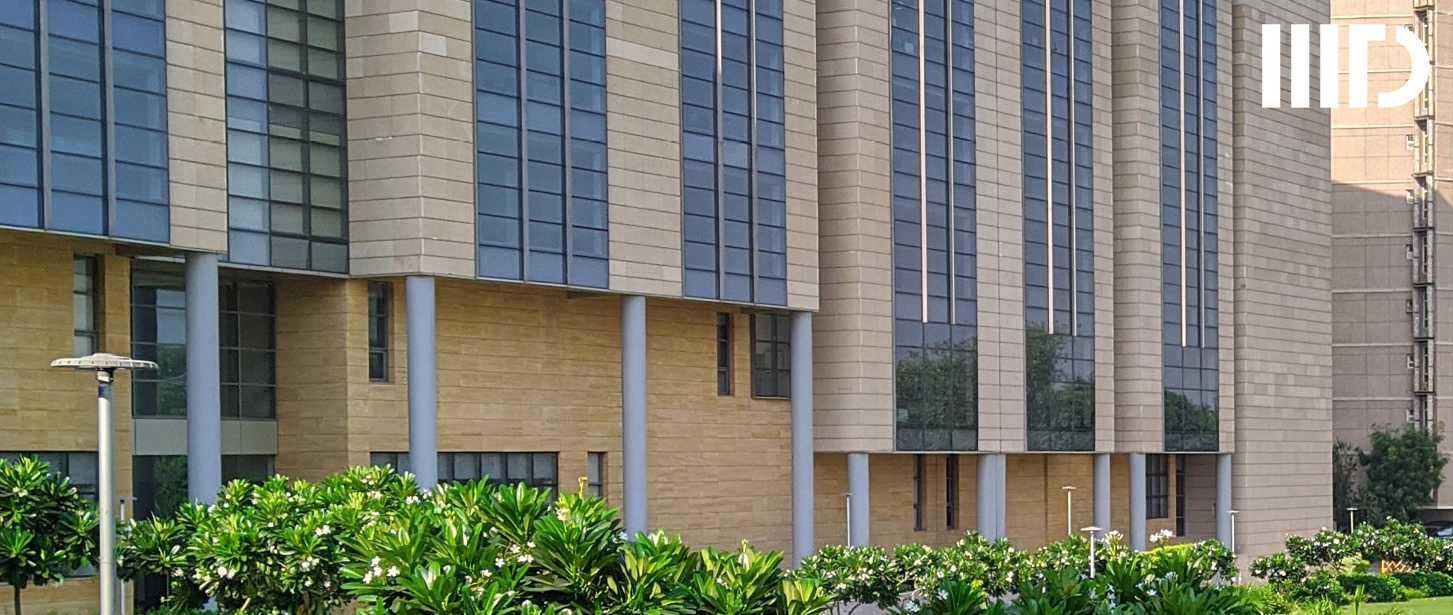
The main objective of the B.Tech. program at IIIT-Delhi is to develop students such that they are well prepared with the necessary core competencies, problem solving and innovation skills needed to succeed in engineering/entrepreneurship careers, and are well prepared to undertake higher studies and research careers. To give due importance to both theoretical and applied aspects, the curriculum for the B.Tech. program covers the foundational aspects of the discipline, and also develops in students the engineering skills for problem solving.
The B.Tech. program is broadly divided in two halves. The first half focuses on building the foundations, and is highly structured. The second half is for developing advanced/specialized skills and knowledge in various sub-areas and application domains. The program provides a lot of flexibility in selecting courses according to the student’s liking and strength.
For each program, there are some program specific outcomes, which are mentioned later. Besides those, there are some general program outcomes that are expected from each program. Each of the programs is expected to develop these in the students:
- Ability to function effectively in teams to accomplish a common goal.
- An understanding of professional and ethical responsibility.
- Ability to communicate effectively with a wide range of audience.
- Ability to self-learn and engage in life-long learning.
- Ability to undertake small research tasks and projects.
- Ability to take an idea and develop into a business plan for an entrepreneurial venture.
- An understanding of impact of solutions on economic, societal, and environment context.
Most engineering programs start with general courses in sciences, and then migrate to specialized courses for the disciplines. Keeping with the contemporary thinking of starting engineering courses early, the B.Tech. programs at IIIT-Delhi starts with courses in Software, Hardware, and Mathematics from first year itself. This structure empowers students with necessary knowledge and skills early in the program. This allows students to discover the novel applications and possibilities of using their knowledge to other domains as well as learn problem solving. The courses tough in the first and second semester are same for all the programs with some program specific subjects in the second semesters.
- Introduction to Programming
- Digital Circuits
- Maths I – Linear Algebra
- Introduction to HCI
- Communication Skills
- Data Structures and Algorithms
- Program-specific course
- Math II – Probability and Statistics
- Computer Organization
- SSH Course
Most of the courses offered in the B.Tech. program are 4 credits each. Normally a 4-credit course requires an average effort of about 10 hours per week (including lectures). A student with full load of 5 courses in a semester should expect to put about 50 hours of effort per week during the semester.
B.Tech. Graduation RequirementsStudents are required to do 156 credits to earn a B.Tech. degree. All B.Tech. programs have a defined set of core courses and many electives. Precise requirements for each B.Tech. program are given in the program specific regulations available here.
Honors ProgramThe B.Tech. program has an Honors option, requirements for which are as below:
- The student must earn an additional 12 discipline credits from in-class courses(i.e., must complete at least 168 credits).
- The student’s program must include a B.Tech. Project.
- At graduation time, the student must have a CGPA of 8.0 or more.
A B.Tech. student can also do a minor in another discipline/area. Requirements for each Minor are specified separately. Broadly, a minor degree requires the student to do about 4 to 6 courses in the minor area, taking electives or free-electives, and by doing extra credits. Currently, Minor programs are offered in Economics, Entrepreneurship, and Computational Biology.
Computer Science and Economics (CSEcon) Program

The increasing presence of digital technologies is transforming business, society, and the economy. The intersection of Economics and Computer Science is rapidly expanding, covering areas such as market design, networks, behavioral economics, financial markets, and macroeconomic modeling. Training in both disciplines is essential to grasp theoretical advancements and their industry and societal applications.
The B.Tech. in Computer Science and Economics at IIIT-Delhi offers rigorous training at the intersection of economics and computation. It prepares students for careers in banking, finance, consulting, tech, and IT services while also providing a strong foundation for graduate studies. With core courses in Computer Science, Economics, and Mathematics, along with diverse electives, the program blends quantitative and computational skills for real-world applications. IIITD leverages its expertise in Computer Science and interdisciplinary education to offer a forward-thinking program which is also aligned with the National Education Policy, 2020.
At the end of this program, a student should have following attributes (in addition to the general attributes mentioned on B.Tech. Page):
- » Understanding the foundations of Computer Science and Economics and their interface.
- » Understanding the principles of computing and its various aspects.
- » Understanding the fundamental principles and tools to analyze markets and design them
- » Understanding the principles of data science for solving problems in economics and public policy.
The program follows the philosophy of having a small set of core courses and many electives allowing students significant flexibility in designing their curriculum and specialization. The overall program structure is given in the table below:
|
Semester 1 |
Semester 2 |
Semester 3 |
Semester 4 |
Semester 5 |
Semester 6 onwards |
|
Introduction to Programming |
Data Structures and Algorithms |
Operating Systems |
Algorithm Design and Analysis |
Game Theory |
[Special Elective - Bucket I] |
|
Digital Circuits |
Principles of Economics |
Macroeconomics |
Convex Optimization |
Econometrics II |
[Special Elective - Bucket II] |
|
Maths-I (Linear Algebra) |
Maths-II (Probability and Statistics) |
Discrete Mathematics |
Database Management Systems |
|
|
|
Introduction to HCI |
Computer Organization |
Advanced Programming |
Econometrics I |
Technical Communication+ Environmental Sciences |
|
|
Communication Skills |
SSH Elective |
Math-III (Multivariate Calculus) |
Microeconomics |
|
|
Note: Special Electives mentioned in [] can be done any semester. However, the prerequisites for the courses must be met first.
Students must do at least one course from each special elective bucket, defined as follows:
|
Bucket 1 |
Bucket 2 |
|
|
The list of courses in buckets I and II may be updated as needed.
For details please see Program Regulations
Admission through JEE Mains. Fees as per Institute norms for the B.Tech Programs.
Computer Science and Engineering (CSE) Program
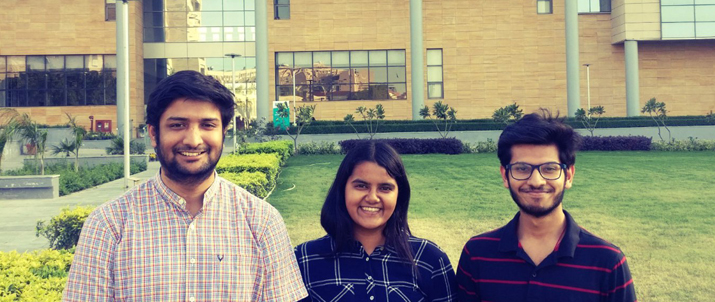
Computer Science is a powerful engineering tool for problem solving in a variety of domains. IIIT-Delhi has developed a CSE program, which, besides developing the computing sciences foundations, also develops in students the engineering skills for problem solving using computing sciences. The program at IIIT-Delhi - "inverts the pyramid" - and start with computing-oriented courses first, and then provides flexibility for taking a variety of courses later. This empowers the students to explore innovative applications of computing in the initial years of the program so they can apply computing techniques in different domains.
Program Objectives for the CSE program are to help develop the following attributes in students (in addition to the general attributes mentioned above):
- Understanding of theoretical foundations and limits of computing.
- Understanding of computing at different levels of abstraction including circuits and computer architecture, operating systems, algorithms, and applications.
- Ability to adapt established models, techniques, algorithms, data structures, etc. for efficiently solving new problems.
- Ability to design, implement, and evaluate computer based system or application to meet the desired needs using modern tools and methodologies.
- Understanding and ability to use advanced techniques and tools in different areas of computing
The set of core courses offered in B.Tech. CSE program are shown in the table below (courses mentioned in [ ] are electives and actual courses for these slots are as defined from semester to semester.)
For students of 2020 batch onwards| SEMESTER 1 | SEMESTER 2 | SEMESTER 3 | SEMESTER 4 | SEMESTER 5 |
|---|---|---|---|---|
| Introduction to Programming | Data Structures and Algorithms | Advanced Programming | Fundamentals of Database Management Systems | |
| Digital Circuits | Basic Electronics | Operating Systems | [Practical Bioinformatics/Prototyping Interactive Systems/Theory of Computation]# | Computer Networks |
| Maths I- (Linear Algebra) | Maths II- (Probability & Statistics) | Discrete Structures / Discrete Mathematics | Algorithm Design and Analysis | |
| Introduction to HCI | Computer Organization | [Math3, Signals & Systems, Embedded Logic Design, ..] | [ Math 4, Graph Theory] | |
| Communication Skills | [SSH] | [SSH] | Technical Communication + Environmental Sciences |
For students of 2019 and previous batches, program structure is available here.
In the 3rd and 4th year, most of the courses are electives. Some of these electives have to be CSE electives, some have to be Social Sciences and Humanities electives, and the rest are Open Electives (i.e. any course can be taken).
Detailed regulations about the program, including the requirements for graduation and the Honors program, are available here.
Electronics and Communications Engineering (ECE) Program
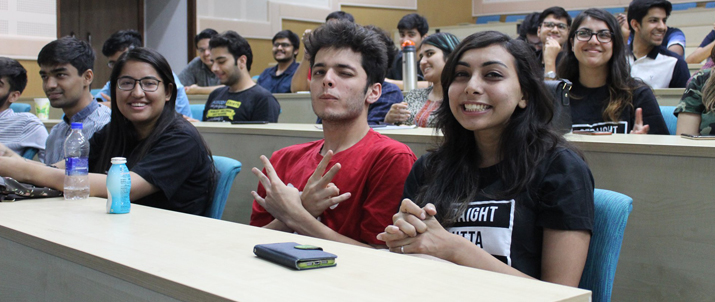
As a discipline, ECE focuses on the design of underlying hardware systems. Our curriculum is directed to applications in major areas such as telecommunications, energy and electronics sectors, while encouraging development of necessary skills for integration of hardware and software components. We believe that many creative opportunities exist at the boundaries of traditional CSE and ECE, and have accordingly planned for cross-training of students across disciplinary boundaries.
The curriculum for ECE therefore has many courses in common with the CSE program initially. The set of core courses are shown in the table below (courses mentioned in [ ] are electives and actual courses for these slots are as defined from semester to semester.)
For students of 2020 batch onwards| SEMESTER 1 | SEMESTER 2 | SEMESTER 3 | SEMESTER 4 | SEMESTER 5 |
|---|---|---|---|---|
| Introduction to Programming | Data Structures and Algorithms | Circuit theory and Devices | Fields & Waves | [Digital Communication Systems – core elect] |
| Digital Circuits | Basic Electronics | Embedded Logic Design | Integrated Electronics | [Digital Signal Processing – core elect] |
| Introduction to HCI | Computer Organization | Signals and Systems | Principles of Communication Systems | |
| Maths I (Linear Algebra) | Maths II(Probability and Statistics) | Maths III(Multivariate Calculus) | Maths IV(ODE/PDE) | |
| Communication Skills | [SSH] | [SSH/Advanced Programming] | Technical Communication + Environmental Sciences |
For students of 2019 and previous batches, program structure is given here.
Most courses in Sem 5th to 8th are electives (an elective course is one which is not compulsory, and a student may have choices from which to select the courses he/she wants to do.). 3 or more elective courses may be chosen from various areas like Circuits and VLSI, Communication Enginnering, Signal & Image Processing and Control & Embedded Systems etc., which allow a student to focus on some areas and gain a deeper knowledge and skills in those.
Detailed regulations about the program, including the requirements for graduation and the Honors program, are available here.
Computer Science and Applied Mathematics (CSAM) Program
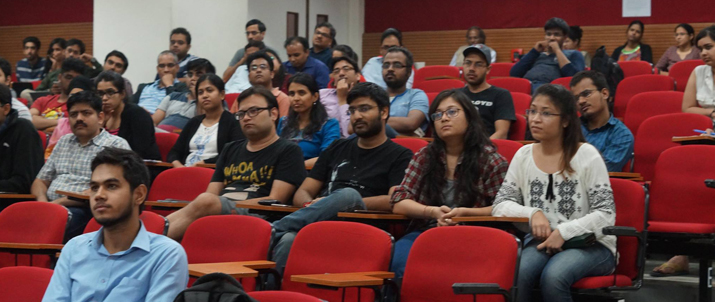
The increasing use of sophisticated mathematical tools and techniques in tandem with computational tools in several areas such as computational finance, biology, e¬commerce, weather forecasting, and data science motivates the need for a program that will produce graduates with computational skills as well as the ability to use sophisticated mathematical concepts and tools in order to tackle these problems.
The Computer Science and Applied Mathematics program aims to develop such graduates. The program is similar to the Mathematics and Computing programs operating in many leading Institutions. The program has a small set of core courses in both Computer Science and Mathematics, and many electives which can be taken from both the disciplines. This enables the students to build a program most suitable for them.
Program Objectives:
At the end of this program, a student should have following attributes (in addition to the general attributes mentioned on B.Tech. Page):
- Understanding of foundational topics in Mathematics.
- Understanding of theoretical foundations and limits of computing and different levels of abstraction including architecture and operating systems, algorithms, and applications.
- Ability to design and implement algorithms and data structures for efficiently solving new problems.
- Ability to use and apply mathematical and statistical techniques and tools to solve problems.
- Ability to abstract and rigorously model and analyze a variety of problems using appropriate mathematical or computational concepts.
The B.Tech. program in CSAM follows the philosophy of having a small set of core courses and many electives allowing students significant flexibility in designing their curriculum and specialization. The overall program structure is given in the table below:
For students of 2020 batch onwards| SEMESTER 1 | SEMESTER 2 | SEMESTER 3 | SEMESTER 4 | SEMESTER 5 | SEMESTER 6 |
|---|---|---|---|---|---|
| Introduction to Programing | Data Structures and Algorithms | Real Analysis I | Math IV (ODE/ PDE) | Special Elective-2 | Optimization Bucket [Linear Optimization/Convex Optimization] |
| Digital Circuits | Basic Electronics | Operating Systems | Abstract Algebra I | Stochastic Processes and Applications | Statistical Inference |
| Maths I (Linear Algebra) | Maths II (Probability and Statistics) | Discrete Structures | Algorithm Design and Analysis | ||
| Introduction to HCI | Computer Organization | Special Elective -1 | Theory of Computation | ||
| Communication Skills | [SSH] | [SSH] | Technical Communication + Environmental Science |
- Number Theory
- Advanced Programing
- Physics
- Signals and Systems
- Real Analysis II
- Scientific Computing
For students of 2019 and previous batches, program structure is given here.
In the final year, all courses are electives. Details about the structure of the program and the requirements for graduation are given here.
Computer Science and Design (CSD) Program
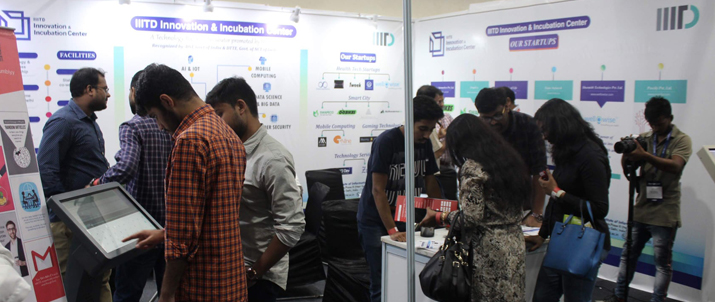
The B.Tech. in Computer Science (CS) and Design aims to develop graduates that are not only well versed with computing approaches, tools, and technologies, but are also experienced with Design approaches and new Media technologies and uses. The program has a small set of core courses in CS and Design, and many electives which can be taken from CS as well as Design and Digital Media. This enables the students to build a program most suitable for them. The program will prepare students to work in the IT industry as well as digital media industry like gaming, animation, virtual/augmented reality, etc. The program will also allow students, who want to pursue higher studies, to take up higher studies in CS/IT or in Design.
Program Objectives:The program aims to develop capabilities in CS as well as Design and Digital Media. At the end of this program, a student should have following attributes (in addition to the general attributes mentioned on B.Tech. Page):
- Understanding of foundations, limits, and capabilities of computing.
- Ability to design and implement efficient software solutions using suitable algorithms, data structures, and other computing techniques.
- Understanding of design principles and techniques and ability to apply these for developing solutions to human/societal problems.
- Ability to independently investigate a problem which can be solved by an Human Computer Interaction (HCI) design process and then design an end-to-end solution to it (i.e., from user need identification to UI design to technical coding and evaluation).
- Ability to effectively use suitable tools and platforms, as well as enhance them, to develop applications/products using for new media design in areas like animation, gaming, virtual reality, etc.
The overall program structure is given in the table below –
For students of 2020 batch onwards| SEMESTER 1 | SEMESTER 2 | SEMESTER 3 | SEMESTER 4 | SEMESTER 5 |
|---|---|---|---|---|
| Introduction to Programming | Data structures and Algorithms | Operating Systems | Algorithm Design and Analysis/Algorithm Design and Analysis(B)* | Computer Networks |
| Digital Circuits | Design Drawing & Visualization | Research Methods in Social Science and Design | Prototyping Interactive Systems | |
| Maths I (Linear Algebra) | Maths II (Probability & Statistics) | Advanced Programming | Design of Interactive systems | |
| Introduction to HCI | Computer Organization | Design Processes & Perspectives | Fundamentals of Database Management Systems | Technical communication + Environmental Sciences |
| Communication Skills | Visual Design & Communication | [Maths III (Multivariate Calculus)/Discrete Mathematics] | [SSH / Maths IV (ODE/PDE/Theory of Computation)] | [Elective] |
* Students who will do Discrete Mathematics in semester 3 will be allowed to do ADA. Also ADA and ADA(B) are anti-requisites.
For students of 2019 to previous batches, program structure is given here.
In the 6th, 7th and 8th Semester all courses are electives. Details about the structure of the program and the requirements for graduation are given here.
Computer Science and Social Sciences (CSSS) Program
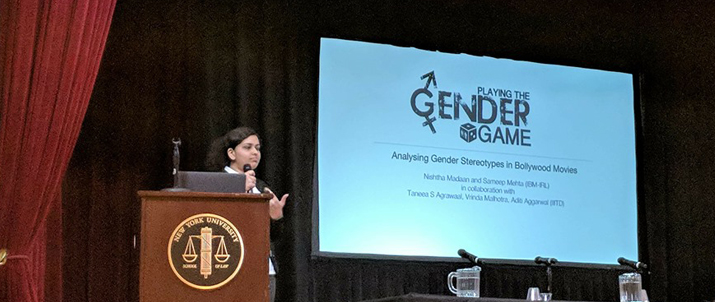
This unique program, B.Tech. in Computer Science (CS) and Social Sciences (SS), aims to develop computer science engineers with strong understanding of relevant social science disciplines. The program will also allow a student to pursue further studies in social sciences, besides allowing them to pursue higher studies in CS/IT, as well as many interdisciplinary programs. As it is a 4 year program, it will satisfy the requirements of almost all higher studies programs in India as well as overseas. It may be an ideal program for those students who are not sure if they want to pursue engineering careers and would like to explore the possibility of going for social sciences later, but want to be ready to take computer science career if desired.
Program Objectives:The program aims to develop capabilities in Computer Science as well as Social Science. At the end of this program, a student should have following attributes (in addition to the general attributes mentioned on B.Tech. Page):
- Understanding of foundations, limits, and capabilities of computing.
- Ability to design and implement efficient software solutions using suitable algorithms, data structures, and other computing techniques.
- Understanding of foundations of social sciences, and articulate the ways in which different social science disciplines (at least two) enhance our understanding of society.
- Ability to use analytical methods, including for data collection, evaluation, and analysis, for understanding issues from different social science perspectives.
- Ability to synthesize concepts and methods from different social science disciplines and Computing and apply these to address issues relating to society.
The B.Tech. program at IIITD follows a philosophy of having a small set of core-courses, allowing students significant flexibility in designing their curriculum and specialization. In the first few semesters mostly core courses are done. The structure for first few semesters is as below, courses mentioned in [ ] are electives and actual courses for these slots are as defined from semester to semester:
For students of 2020 batch onwards| SEMESTER 1 | SEMESTER 2 | SEMESTER 3 | SEMESTER 4 | SEMESTER 5 |
|---|---|---|---|---|
| Introduction to Programming | Data Structures and Algorithms | Operating Systems | Algorithm Design and Analysis | |
| Digital Circuits | Introduction to Sociology/Anthropology | Research methods in Social Science and Design | Convex Optimization | |
| Maths I (Linear Algebra) | Maths II (Probability & Statistics) | Discrete Structures/ Discrete Mathematics | Fundamentals of Database Management Systems | |
| Introduction to HCI | Computer Organization | Advanced Programming | Econometrics I | Technical Communication + Environmental Sciences |
| Communication Skills | Critical thinking and Readings in Social Sciences | Maths III (Advanced Calculus) |
For students of 2019 and previous batches. Click here
In the 6th, 7th and 8th Semester all courses are electives. Details about the structure of the program and the requirements for graduation are given here.
Computer Science and Biosciences (CSB) Program
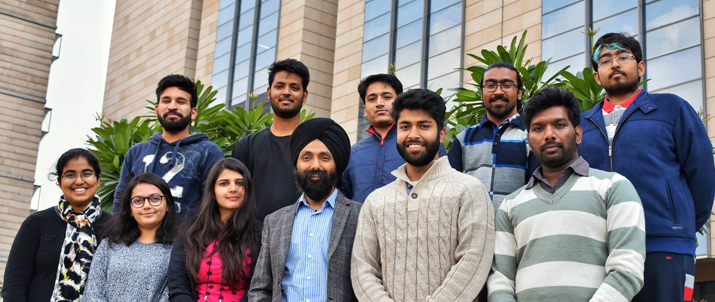
With the advent of high-throughput techniques, biological sciences are grappling with a paradigm shift towards data-intensive explorations and challenges for management and analysis of massive data. Apart from fundamental contributions to basic science, data driven analysis in biology has the potential to conquer challenges such as modeling and control of complex diseases, management and diagnosis of pathologies, personalized medicine, drug and vaccine design, among others. Making progress on these frontiers requires insight into biological processes, algorithms, machine learning techniques, mathematical modeling, apart from numerical and programming skills. Thus, interdisciplinary education that imparts knowledge of foundations of biology and computer science as well as training in modeling and analysis of biomedical data is the key to create personnel who can provide solutions to problems on the interface of computation and biology. Knowledge of different aspects of modern biology and computational sciences will facilitate addressing relevant problems in biology and medicine. Towards this aim, an undergraduate program that seamlessly integrates foundations of computer science, biology and mathematics along with training to ask data-driven questions in biology and medicine is an important step in this direction.
Program Objectives:The program aims to develop capabilities in Computer Sciences as well as in Biosciences. At the end of this program, a student should have following attributes (in addition to the general attributes mentioned on B.Tech. Page):
- Understanding of foundations, capabilities and limits of computing.
- Ability to design and implement efficient software solutions particularly for biological applications using suitable algorithms, data structures, and other computing techniques.
- Understanding of foundations of biological sciences and biological data.
- Ability to compile, manage and analyze data to address problems in biological and medical sciences.
- Ability to build and apply mathematical modeling techniques to biological problems.
The B.Tech. program at IIITD follows a philosophy of having a small set of core-courses, allowing students significant flexibility in designing their curriculum and specialization. Majority of core courses are completed in the first four semesters.
The structure for first few semesters is as follows:
For students of 2024 batch onwards| SEMESTER 1 | SEMESTER 2 | SEMESTER 3 | SEMESTER 4 | SEMESTER 5 |
|---|---|---|---|---|
| Introduction to Programming | Data Structures and Algorithms | Operating Systems | Algorithm Design and Analysis | |
| Introduction to HCI | Computer Organization | Advanced Programming | Fundamentals of Database Management Systems | |
| Maths I – (Linear Algebra) | Maths II -(Probability & Statistics) | Discrete Mathematics/ Discrete Structure | [GraphTheory/ Introduction to Mathematical Logic] | |
| Digital Circuits | Foundations of Biology I | Foundations of Biology II | Biophysics | |
| Communication Skills | [SSH] | Introduction to Quantitative Biology | Foundations of Biomedical Informatics | Technical communication + Environment Studies |
For students of 2019 and previous batches. Click here
In the 6th, 7th and 8th Semester all courses are electives. Details about the structure of the program and the requirements for graduation are given here.
Computer Science and Artificial Intelligence (CSAI) Program
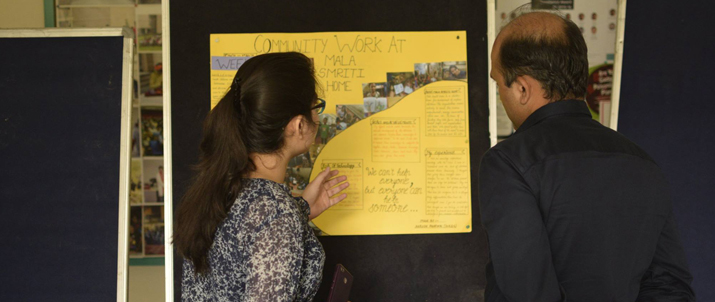
Artificial Intelligence (AI) has become an integral part of technology in our daily lives, driving to office, searching for a restaurant, getting news updates, and recommendations on social media are all using AI. With increase in usage, there is a significant requirement of researchers who can understand AI and build AI technologies. This program will provide students an opportunity to learn both foundational and experimental components of AI and Machine Learning.
A student completing this program will be able to undertake industry careers involving innovation and problem solving using Artificial Intelligence (AI) and Machine Learning (ML) technologies and research careers in AI, ML, and, in general, Computer Science areas. Along with courses that provide specialization in AI, students will also have an option to explore applied domains such as computer vision, natural language processing, robotics, and autonomous systems as well as other interdisciplinary areas such as neuroscience, edge computing, and Internet of Things.
Program Objectives:At the end of this program, a student should have following attributes (in addition to the general attributes mentioned on B.Tech. Page):
- Understanding of foundational topics in Computer Science, Artificial Intelligence, and Machine Learning.
- Understanding of theoretical foundations and limits of Artificial Intelligence and Machine Learning.
- Ability to design and implement algorithms and data structures for efficiently solving new problems.
- Ability to model and analyze a variety of problems using appropriate mathematical/computational and AI concepts.
- Ability of apply and develop AI algorithms to transform large amount of data into intelligent decisions and/or behavior.
- An understanding of the impact of AI based solutions in an economic, societal, and environment context.
The Foundation program provides the basic knowledge about Computer Science and Artificial Intelligence (CSAI) through a set of core courses, which are compulsory for all students. The set of core courses are shown in the table below (courses mentioned in [ ] are electives and actual courses for these slots are as defined from semester to semester.)
For students of 2020 batch onwards| SEMESTER 1 | SEMESTER 2 | SEMESTER 3 | SEMESTER 4 | SEMESTER 5 | SEMESTER 6 |
|---|---|---|---|---|---|
| Introduction to Programming | Data Structures and Algorithms | Advanced Programming | [Fundamental of database Management System / Computer Organization / Ethics in AI] | Machine Learning | |
| Digital Circuits | Introduction of Intelligent Systems | Operating Systems | [Maths IV / Graph Theory / Statistical Inference / Introduction to Mathematical Logic / Theory of Computation] | Computer Architecture / Computer Network Compilers ] | Ethics in Artificial Intelligence |
| Maths I (Linear Algebra) | Maths II (Probability and Statistics) | Discrete Mathematics / Discrete Structures | Algorithm Design and Analysis | Artificial Intelligence | [2 AI Core Courses] |
| Introduction to HCI | [Computer Organization / Fundamentals of Database Management Systems] | Maths III | Statistical Machine Learning | [4 AI Application Electives] | |
| Communication Skills | [SSH] | Signal & Systems | Optimization Bucket [Linear Optimization/Convex Optimization] | Technical Communication + Environmental Science | |
For students of 2019 and previous batches. Click here
For B.Tech. (CSAI), the program structure & requirements for graduation and the Honors program, are given here.
Electronics and VLSI Engineering (EVE) Program

IIIT Delhi aims to encourage research and innovation in Information Technology (IT) and allied areas. The objective of the B.Tech. program in Electronics and VLSI Engineering (EVE) is to prepare students to undertake careers involving innovation and problem solving using suitable techniques and hardware and software technologies, or to undertake advanced studies for research careers.
In order to give due importance to applied as well as theoretical aspects of EVE, the curriculum for the B.Tech. (EVE) program covers most of the foundational aspects and also develops in students the engineering skills for problem solving. Towards this, the B.Tech. (EVE) program at IIIT-Delhi starts with computing and Electronics courses first, and allows the possibility of doing science courses later. Besides being better suited for developing engineering capabilities, it also enables the possibility of students seeing newer applications and possibilities of using computing and electronics in these subjects.
Program Objectives:TBA
Program Structure:The first semester of the EVE program is common with all - this allows flexibility to students in moving from one program to the other. The second and third semester is common with the ECE program. The fourth and fifth semester of the program is relatively fixed, comprising mostly core courses for the program. From sixth semester onward the program can be mostly flexible, consisting of electives.
For students of 2022 batch onwards| SEMESTER 1 | SEMESTER 2 | SEMESTER 3 | SEMESTER 4 | SEMESTER 5 |
|---|---|---|---|---|
| Introduction to Programming | Data Structures and Algorithms | Circuit theory and Devices | Fields & Waves | Digital VLSI Design |
| Digital Circuits | Basic Electronics | Embedded Logic Design | Integrated Electronics | Analog CMOS Design |
| Introduction to HCI | Computer Organization | Signals and Systems | Physics of Semiconductor Devices | VLSI Design Flow |
| Maths I (Linear Algebra) | Maths II (Probability and Statistics) | Maths III (Multivariate Calculus) | Electronic System Design | |
| Communication Skills | [SSH] | [SSH/Advanced Programming] | [Open Elective] | Technical Communication + Environmental Sciences |
| Semester | Technical Courses | Non-Technical Courses |
|---|---|---|
| Semester 1 | Introduction to Programming Digital Circuits Maths I (Linear Algebra) Introduction to HCI | Communication Skills |
| Semester 2 | Data Structures and Algorithms Basic Electronics Maths II (Probability and Statistics) Computer Organization | SSH Elective |
Program Details for UG (CSE) Joint Program with UAlbany

A. Should have completed the following courses
- » Introduction to Programming
- » Digital Circuits
- » Maths I (Linear Algebra)
- » Introduction to HCI
- » Communication Skills
- » Structures and Algorithms
- » Basic Electronics
- » Maths II (Probability & Statistics)
- » Computer Organization
- » Advanced Programming
- » Operating Systems
- » Discrete Mathematics
- » Fundamentals of Database Management Systems
- » Algorithm Design and Analysis
B. Should have completed one course from each bracket
- » [Math3 / Signals & Systems / Embedded Logic Design]
- » [Practical Bioinformatics / Prototyping Interactive Systems / Theory of Computation]
- » [Math 4 / Graph Theory]
C. Courses to be completed at IIIT-Delhi or At UAlbany with the mapped courses
- » Computer Networks [At IIIT-Delhi] OR ICSI 000 [At UAlbany]
- » Technical Communication + Environmental Sciences [At IIIT-Delhi] OR ACOM 000 +AENV E10 [AT UAlbany]
D. Should have done at least 12 credits of Social Sciences and Humanities (SSH) courses.
E. Should have done 2 credits of Community Work (CW) and Self Growth (SG) each.
.png)
General requirements:
- » Students attending UAlbany shall be required to enroll in the mandatory health insurance program of the State University of New York (SUNY) at their own expense.
- » Students are responsible for providing UAlbany with all necessary information and documentation to obtain visas and entry documentation.
- » Enrolled students are responsible, at all times, for maintaining appropriate immigrant status while at UAlbany.
- » Students attending UAlbany on an F-1 student visa must document their ability to meet all expenses while attending UAlbany by submitting a financial affidavit and financial documents.
Note:
- » If an IIIT-Delhi B. Tech student does not complete the degree requirements for the BS-DF program at UAlbany, UAlbany will not object to the student transferring their credits to IIIT-Delhi to be applied toward their B. Tech degree. However, you will be eligible for IIIT-Delhi B.Tech. degree, provided you complete all the graduation requirements as per the IIIT-Delhi regulations.
- » All tuition, room, board, and other fees charged by UAlbany for enrollment and attendance at UAlbany shall be paid directly to UAlbany.
- » Students shall be responsible for paying all other costs of enrollment at IIIT-Delhi and UAlbany, including, but not limited to, travel, visas, passports, books, computers, supplies, medical insurance and treatment, vaccinations, personal expenses, and any other expenses incurred by the students to participate in this dual degree partnership.
- » UAlbany BS-DF students demonstrating exceptional academic achievement may be eligible for a scholarship while at UAlbany for up to $9,500 per year for the Fall and Spring semesters (the award of scholarship and its amount may vary as per the discretion of UAlbany).
- » Neither UAlbany nor IIIT-Delhi shall be responsible for the acts of the other nor for the acts of any student participating in this program.
The information provided above is derived from the Memorandum of Understanding (MoU). In the event of any discrepancies, the MoU and the regulations of each university will take precedence. Therefore, applicants are strongly advised to review both the MoU and the regulations of the respective universities before finalizing their plans.
Program Details for UG (ECE) Joint Program with UAlbany

A. Should have completed the following courses
- » Introduction to Programming
- » Circuits
- » Maths I (Linear Algebra)
- » Introduction to HCI
- » Communication Skills
- » Data Structures and Algorithms
- » Basic Electronics
- » Maths II (Probability & Statistics)
- » Computer Organization
- » Circuit Theory and Devices
- » Embedded Logic Design
- » Signals and Systems
- » Maths III (Multivariate Calculus)
- » Fields and Waves
- » Integrated Electronics
- » Principles of Communication Systems
- » Maths IV (ODE/PDE)
B. Should have completed the following courses at IIIT-Delhi or will complete them at UAlbany as per the mapped courses
- » Technical Communication + Environmental Sciences [At IIIT-Delhi] OR ACOM 000 +AENV E10 [AT UAlbany]
C. Should have done at least 12 credits of Social Sciences and Humanities (SSH) courses.
D. Should have done 2 credits of Community Work (CW) and Self Growth (SG) each.
.png)
General requirements:
- » Students attending UAlbany shall be required to enroll in the mandatory health insurance program of the State University of New York (SUNY) at their own expense.
- » Students are responsible for providing UAlbany with all necessary information and documentation to obtain visas and entry documentation.
- » Enrolled students are responsible, at all times, for maintaining appropriate immigrant status while at UAlbany.
- » Students attending UAlbany on an F-1 student visa must document their ability to meet all expenses while attending UAlbany by submitting a financial affidavit and financial documents.
Note:
- » If an IIIT-Delhi B. Tech student does not complete the degree requirements for the BS-DF program at UAlbany, UAlbany will not object to the student transferring their credits to IIIT-Delhi to be applied toward their B. Tech degree. However, you will be eligible for IIIT-Delhi B.Tech. degree, provided you complete all the graduation requirements as per the IIIT-Delhi regulations.
- » All tuition, room, board, and other fees charged by UAlbany for enrollment and attendance at UAlbany shall be paid directly to UAlbany.
- » Students shall be responsible for paying all other costs of enrollment at IIIT-Delhi and UAlbany, including, but not limited to, travel, visas, passports, books, computers, supplies, medical insurance and treatment, vaccinations, personal expenses, and any other expenses incurred by the students to participate in this dual degree partnership.
- » UAlbany BS-DF students demonstrating exceptional academic achievement may be eligible for a scholarship while at UAlbany for up to $9,500 per year for the Fall and Spring semesters (the award of scholarship and its amount may vary as per the discretion of UAlbany).
- » Neither UAlbany nor IIIT-Delhi shall be responsible for the acts of the other nor for the acts of any student participating in this program.
The information provided above is derived from the Memorandum of Understanding (MoU). In the event of any discrepancies, the MoU and the regulations of each university will take precedence. Therefore, applicants are strongly advised to review both the MoU and the regulations of the respective universities before finalizing their plans.
Last updated: 14-01-2026



